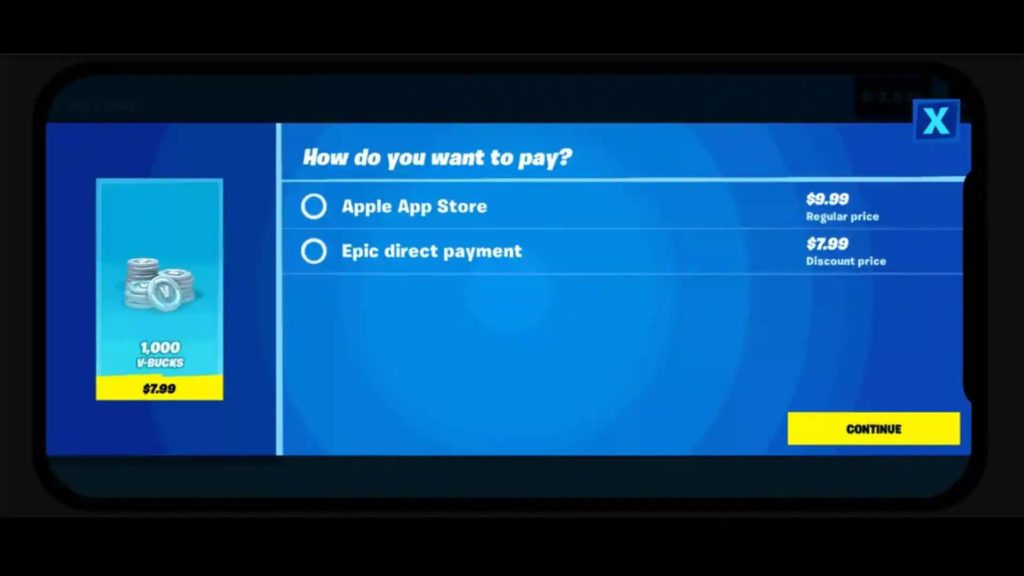Epic Games goes to war with Apple

A few minutes every morning is all you need.
Stay up to date on the world's Headlines and Human Stories. It's fun, it's factual, it's fluff-free.
Apple Inc. has come under increasing fire in the last few months over the policies of its iOS App Store, which some developers claim breaches antitrust rules and stifles competition.
Criticism is focused on a 30% commission that Apple takes from in-app purchases and subscriptions on apps from the App Store.
Epic Games, the developer of the popular video game Fortnite, recently drew Apple’s ire by attempting to institute its own payment system on the iOS version of the game, cutting out the 30% commission that developers have claimed raises prices for consumers.
This is no small scrap between rival developers, but a potentially multibillion-dollar dispute that could seal the future of Apple’s lucrative App Store and the company itself.
1984
Apple’s App Store policies require apps that it hosts to use Apple’s own payment system in return for being allowed on the store, which permits Apple to take a 30% cut from digital purchases and subscriptions.
Epic Games had already been a notable critic of Apple’s policies. Epic’s chief executive officer, Tim Sweeney, told The Verge in 2018 that Apple and other manufacturers “make vast, vast profits from the sale of their devices and do not in any way justify the 30 percent cut” that is imposed on their App Store.
Epic’s move appears to have been targeted to draw a response from Apple. Epic announced its new payment system – allowing Fortnite players to bypass Apple’s payment system and pay directly for digital items through Fortnite itself – as a consumer-friendly development that cut prices for players, previously inflated as a result of the “Apple tax.”

Soon after Epic’s move, Apple removed Fortnite from the App Store, announcing that Epic had taken the “unfortunate step of violating the App Store guidelines.”
It was also revealed that Apple had threatened to cut off Epic’s access to developer tools for the iOS and Mac platforms, access that is necessary to host anything on Apple’s platforms, if they did not “cure” their breaches of the App Store guidelines.
In response, Epic released a protest video claiming Apple’s actions were monopolistic and akin to the George Orwell novel “1984.” The video itself mirrors an advert produced by Apple in 1984 when it was then challenging IBM’s dominance over the computer industry.
Epic also launched an antitrust lawsuit – one of several lawsuits and investigations Apple is currently facing – seeking to establish the App Store as a “monopoly” and thus force a change to the controversial App Store policies.
The “Apple Tax”
Epic’s antagonism of Apple and its App Store policies is the most recent development in an escalating dispute between the tech giant and developers that want access to its mobile platform, but feel the 30% cut Apple takes is exorbitant.
Apple had already faced criticism from Spotify, the music streaming company, and Rakuten, the e-commerce platform, for alleged anti-competitive actions linked to the controversial 30% “Apple Tax.” Spotify and Rakuten’s complaints led the European Commission to open two antitrust investigations into the App Store and Apple Pay practices in June of this year.
Around the same time, Apple also fell into dispute with Hey, a subscription-based email app. Apple’s policies supposedly allow users to use preexisting subscriptions on apps hosted on the App Store without purchasing them through Apple’s own system if they had already been purchased elsewhere.
But when Hey introduced a bug-fixing update to its subscription email app in June, it received word from Apple that it had breached guidelines and would be removed from the App Store if it did not implement Apple’s in-app purchase system allowing Apple a 30% commission.
The chief technology officer of Basecamp, the company behind Hey, tweeted that “Apple’s ransom” was “profoundly, perversely abusive and unfair” and compared Apple to “gangsters.”
It’s not just developers that have criticized Apple’s policies. Rival tech giants have also joined the fray.
In an interview with Politico last June, Microsoft’s chief legal officer, Brad Smith, said that Apple’s App Store policies – specifically the 30% commission – amount to exceedingly stringent “requirements that increasingly say there’s only one way to get onto our platform, and that is to go through the gate that we ourselves have created.”
Apple’s future
Apple’s 30% App Store commission is largely responsible for the vast amounts of revenue the platform generates for the company.
Although Apple’s late CEO Steve Jobs said in 2008, the year of the App Store’s launch, that “we don’t expect this to be a big profit generator,” it is clear that the App Store has grown exponentially in importance for Apple’s revenues and future success.
In 2019 alone, the percentage Apple received on digital content sold on the App Store amounted to some US$18.3 billion, nearly 40% of its total service revenue, which includes other Apple products such as Apple Music, TV and more. The App Store is also home to a US$519 billion developer ecosystem and is Apple’s second-biggest revenue driver behind sales of the iPhone.
As Chaim Gartenberg writes in The Verge, the escalating criticism leveled at Apple has huge consequences. With “one of the key sources of revenue” for Apple under threat, it’s “a source it could lose permanently” if the recent spate of criticism and the antitrust investigation it’s spawned prevails.
Apple faces attacks from all angles – from regulators, developers and rival tech companies. At stake is not just the 30% App Store commission that Apple receives, but the future of the company as a whole.
Have a tip or story? Get in touch with our reporters at tips@themilsource.com




Comments ()